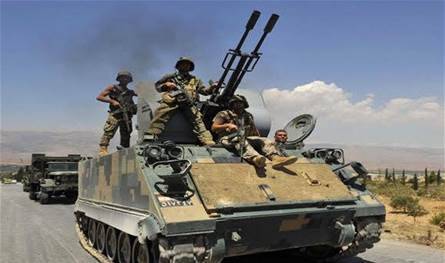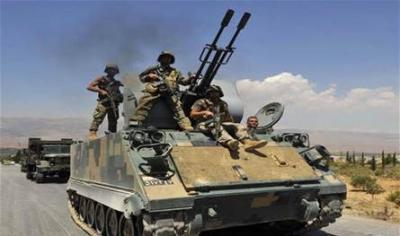Recently, the army has been involved in operations in several neighborhoods of the Baalbek area, particularly in the al-Sharawna neighborhood, searching for wanted individuals, notably the drug dealer Ali Mounzer Zaiter, known as "Abu Sela." What are the circumstances surrounding this operation? What are the responses to the criticisms directed at the army by figures from the Bekaa region regarding its proceedings?
This is neither the first nor the last confrontation between the army and those fleeing justice. However, this particular round seems to carry a different weight, firstly because one of its targets, "Abu Sela," is not an ordinary wanted person, and secondly due to the on-ground realities that elicited reactions from figures who criticized the army for allegedly using excessive force.
In contrast, well-informed security sources told "Al-Jumhuriya" that the operation carried out by the army in the Baalbek area was meticulously planned, taking into account the necessity of protecting civilians, including members of "Abu Sela's" family. They revealed that the loss of a soldier was a result of the aim to avoid harming "Abu Sela's" wife, whom he had used as a shield during the raid.
The sources emphasize that the mission was targeted in terms of the choice of objective and timing. "The army does not perceive Baalbek as hostile in any way; rather, it views it as a supportive environment, and it is supportive of the people there."
The sources assert that the army only used a very small percentage of its capabilities in pursuing "Abu Sela" and his associates. "If it had wanted to achieve its objective at any cost, the situation would have been different. However, it is keen on the safety of innocent citizens and on protecting the residents of the area from the scourge of drugs that have begun to affect its youth."
They indicate that the demolition of the private quarters of "Abu Sela" and his associates serves as a message that these locations are places for the destruction of their children, not shelters for them.
The sources point out that the army's insistence on pursuing the wanted individuals sends a positive signal to the Lebanese people and tourists, indicating that the tourist season in the Bekaa region, particularly in Baalbek, will be safe and successful, benefiting the residents of that area.
The sources reveal that the army aimed to capture "Abu Sela" alive to benefit from the treasure trove of information he holds regarding the drug trade and its promotion, pointing out that he is among the most dangerous wanted individuals in this regard, with 390 arrest warrants issued against him.
The sources explain that after "Abu Sela" could not be arrested and fled with a gunshot wound to his thigh, the army continued its operations to arrest other wanted individuals and raid drug manufacturing facilities.
They confirm that certain units completed their military tasks, while others are still actively pursuing operations in the area, clarifying that intelligence and security work will continue through surveillance and monitoring in search of "Abu Sela," whose health condition has deteriorated following his injury.
Sources report that a group of army intelligence personnel in Baalbek surprised "Abu Sela" at his home after gathering accurate information about his whereabouts. However, when they attempted to arrest him, they encountered heavy gunfire from armed individuals stationed in nearby buildings, allowing "Abu Sela" to escape through narrow alleys. It is noted that the presence of civilians inside the house hindered the movement of the intelligence unit.
Sources indicate that this attempt to detain "Abu Sela" is not the first, as he has previously escaped from multiple traps set for him amid the ongoing cat-and-mouse game between him and security forces since 2014 when he lived in the Sabtieh area before fleeing from there.
The sources add that over time, "Abu Sela" has extended his influence significantly, managing a large network to promote drugs, which included Lebanese and Syrians, successfully infiltrating several schools and universities. Moreover, it has been reported that he exploits the difficult circumstances of some families by offering to pay their children's tuition fees, only to later use them to distribute drugs in their neighborhoods, exacerbating his threat in the community.




